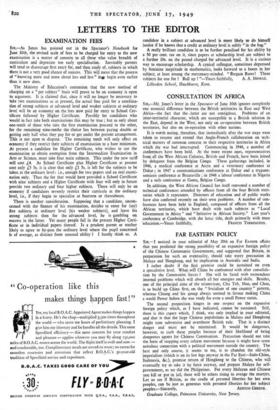LETTERS TO THE EDITOR
EXAMINATION FEES
Sta,—As Janus has pointed out in the Spectator's Notebook for June 10th, the revised scale of fees to be charged for entry to the new examination is a matter of concern to all those who value breadth of curriculum and deprecate too early specialisation. Inevitably parents will tend to discourage first entry for, and then study of, subjects in which there is not a very good chance of success. This will mean that the process of "knowing more and more about less and less" Mar begin even earlier than it now does.
The Ministry of Education's contention that the new method of charging on a " per subject " basis will prove to be an economy is open to argument. It is claimed that, since it will no longer be necessary to take two examinations as at present, the actual fees paid for a combina- tion of strong subjects at. advanced level and weaker subjects at ordinary level will be an economy on the fees now paid for entry to School Cer- tificate followed by Higher Certificate. Possibly for candidates who would in fact take both examinations this may be true ; but as only about one-tenth of those who take the first examination proceed to the other, for the remaining nine-tenths the choice lies between paying double or getting only half what they pay for or get under the present arrangement. This is not open to dispute. The remaining tenth will only effect an economy if they restrict their subjects of examination to a bare minimum. At present a candidate for Higher Certificate, who wishes to use the examination to obtain exemption from the Intermediate Examination in Arts or Science, must take four main subjects. This under the new tariff will cost £4. As School Certificate plus Higher Certificate at present cost only £5 5s. it is clear that only £1 5s. is left for the subjects to be taken at the ordinary level: i.e., enough for two papers and an oral exami- nation only. Thus the fee that would have provided a School Certificate with nine subjects and a Higher Certificate with four will only in future provide two ordinary and four higher subjects. There will only be an economy if candidates severely restrict their curricula at the ordinary level, i.e., if they begin to specialise at fourteen or thereabouts.
There is another consideration. Supposing that a candidate, uncon- cerned with the finance of his examination, decides to enter for (say) five subjects at ordinary level (his weaker subjects), and leave his strong subjects then for the advanced level, he is gambling on success in the latter. Yet many people fail in the present Higher Certi- ficate or in individual papers thereof. Is a prudent parent or teacher likely to agree to by-pass the ordinary level where the pupil concerned is of average, as distinct from unusual ability ?. I hardly think so. A
candidate in a subject at advanced level is more likely to do himself justice if he knows that a credit at ordinary level is safely "in the bag."
A really brilliant candidate is to be further penalised for his ability by a 50 per cent. tax on it, since papers at scholarship level are subject to a further 10s. on the pound charged for advanced level. It is a curious way to encourage scholarship. A cynical colleague, sometimes depressed by feminine ineptitude in mathematics, looks forward to a boom in her subject, at least among the mercenary-minded. " Bargain Rates! Three
subjects for one fee I Roll up ! "—Yours faithfully, A. A. MOWAT. Lillesden School, Hawkhurst, Kent.






































 Previous page
Previous page